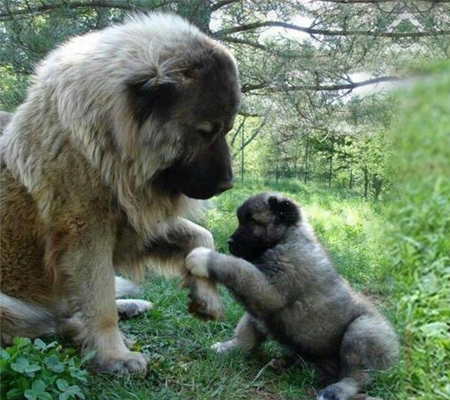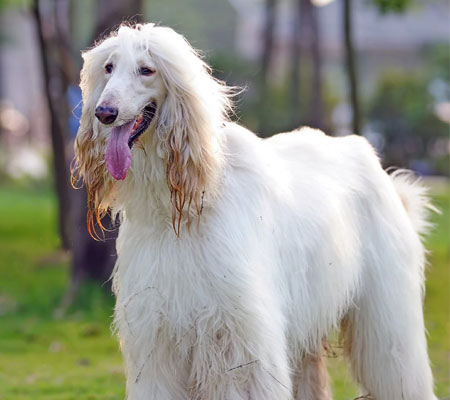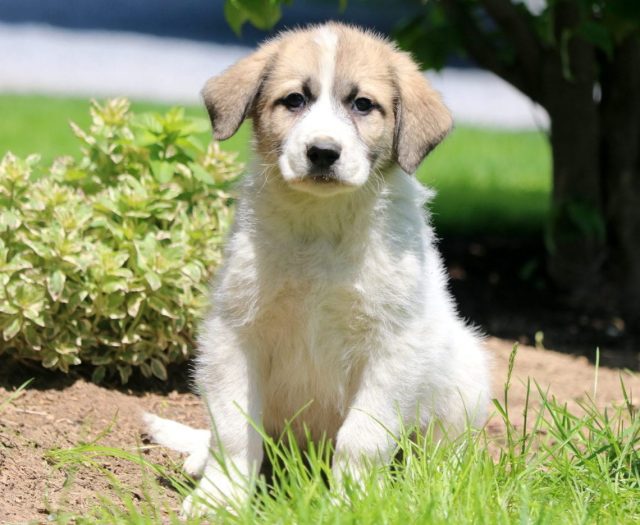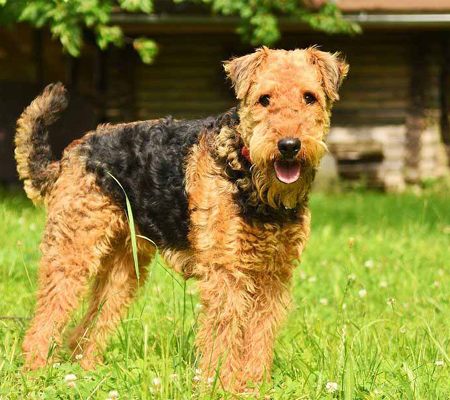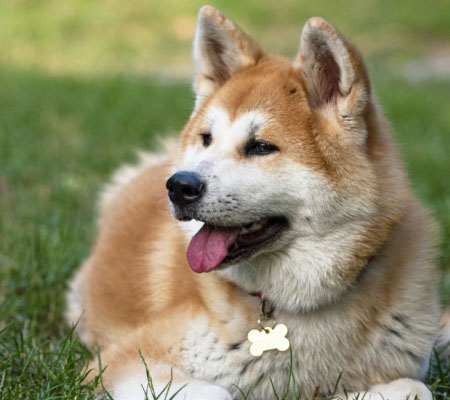The Caucasian Shepherd Dog is a formidable family
protector who is loyal, strong, and fearless. In the harsh Caucasus Mountain
region, they were bred to look after flocks and defend the home against wild
predators. There are various varieties and kinds of Caucasian Mountain Dogs,
Russian Bear Dogs, Baskhan (Karachay) Pariy, Caucasian Ovcharka Dogs, and
simply CO.
Even against bears or wolves, this large breed is
fiercely territorial and will not back down from a confrontation. Although
Caucasian Shepherd Dogs are bright, they can be tough to teach due to their
obstinate, independent personality. If an expert trainer does not keep them in
control, their innate suspicion of strangers and other animals might develop to
violent behaviours.
This breed is not suitable for inexperienced owners,
and while being relatively low-energy dogs, Caucasian Shepherd Dogs are too
large for apartment life and houses with little children. Despite this,
Caucasian Shepherd Dogs may make excellent watchdogs, family pets, and even
therapy dogs with proper training and socialisation.
While they may not appeal to first-time dog
owners, Caucasian Shepherd Dogs will lavish gentle love and devotion on
experienced, patient, and persistent trainers, making them wonderful lifetime
family members.
Caucasian Shepherd Dog Highlights
Breed Size
Extra large
Nature
Gentle, Willful, Aloof, Friendly
Energy Level
Cool
Intelligence
High
Barking Level
When Necessary
Coat Length
Short, Medium, carly
Breed Group
Working
Droll Amount
Low
Good with
Familes, Children, Dog
Feed Level
Medium, High
Colour Type
Red, cream, fawn, white, gray, brown, Chocolate, liver
Other Facts
Requires lots of grooming, loves water, cold weather tolerant, strong loyalty tendencies, good hiking companion.
Dog History
The Caucasian Shepherd Dog is one of the oldest
and most ancient Molasser breeds, with the origins of these massive, protecting
canines unknown. They are indigenous to the Caucasus Mountains and have been
present for about 2,000 years. Some say they are descended from domesticated
wolves, while others claim they are related to Mastiffs and other breeds. Many
experts believe the Caucasian Shepherd Dog is derived from Tibetan sheepdogs,
however recent archaeological evidence shows the breed originated in Mesopotamia.
Caucasian Shepherd Dogs have been a vital companion to the shepherds of the
Caucasus area for ages, regardless of where they originated. They aggressively
protected sheep herds and their owners from predators like as wolves, jackles
and bears.They had to be brave, powerful, and menacing, as well as able to
withstand the cold and hard surroundings.
Because the Caucasus Mountain region is so large,
several distinct breed variations occurred, yet the Caucasian Shepherd Dogs
that originated in Georgia became the breed standard that is recognised by most
kennel associations today. The communist USSR began employing Caucasian
Shepherds as prisoner guard dogs in the early 1900s, and utilised them to
produce other breeds in army kennels. East Germany used the breed as border
police dogs along the Berlin Wall in the 1960s. When the Berlin Wall came down
in 1989, 7,000 patrol dogs were distributed, with many being donated to German
families to live out their days.
Although shepherds still employ Caucasian
Shepherd Dogs to care to flocks, they are largely utilised as household
companions, watchdogs, and property protectors nowadays. They've kept a lot of
their cautious, standoffish, and even aggressive characteristics, so they'll
require early socialisation and strong training to avoid mishaps. As the breed
gets more popular, breeders are likely to strive to eliminate some of the less
attractive traits.
22-27 inch 43-55 kg 10-13 year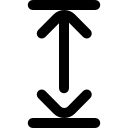
Height

Weight

Life Span
Health and Care
Although the Caucasian Shepherd Dog is generally
regarded as a healthy breed, it is susceptible to hip dysplasia, as are many
big breeds. Cataracts are also a possibility. Obesity is one of the most
prevalent issues they confront. Caucasian Shepherd Dogs should be fed a
giant-breed diet, although they do not have excessively high energy levels,
which should be taken into account. They'll need to be exercised, and vets
should keep an eye on their weight. Consult your veterinarian or a nutritionist
about developing a suitable diet and exercise routine for your Caucasian
Shepherd Dog to avoid obesity. To avoid this, your veterinarian may advise you
to feed them smaller, more often meals throughout the day rather than larger
ones.
Care
Weight management with proper nutrition and
exercise is the most important aspect of treatment for Caucasian Shepherd Dogs.
You should talk to your veterinarian or a nutritionist about them. Beyond that,
your Caucasian Shepherd Dog's teeth should be brushed twice a week and
thoroughly cleaned as prescribed by your veterinarian. Ears should be examined
at least once a week for signs of dirt or wax buildup and cleaned as needed.
Ear infections may occur if this is not done. To avoid breakage and harm, nails
should be cut as needed. You may also need to keep an eye out for drool and
wipe it away as needed to avoid slobber all over your house.
Dog Breed Care Tips and
Important Instructions
Depending on whether you choose a short-haired,
medium-haired, or long-haired Caucasian shepherd, the grooming process will be
more or less intensive. Daily brushing is required for the long-coated
Caucasian shepherd, and Albrecht warns that matts can form behind their ears
and around their rears, which must be avoided.
"The wonderful thing about Caucasians is
that they don't shed all the time," he remarks. "They shed their
coats once a year for me, however they might shed more frequently in various
settings. So you don't have to deal with dog fur all the time."
Caucasian shepherds' nails must be kept trimmed,
and their ears must be examined and cleaned on a regular basis.
Start training early and consistently with any
dog, especially a huge breed. The Caucasian shepherd, known for their
intelligence and independence, may be difficult to teach, while Albrecht claims
they are simpler to train than other big breeds. "They're quick
learners," Albrecht adds, adding that two of his mixed-breed Caucasians
are presently undergoing service dog training.
For the greatest training outcomes, treat a
Caucasian shepherd like a part of your family and utilise positive
reinforcement.
Feeding
Shepherd, Caucasian Dogs should be fed a diet
designed for a large breed with a low amount of energy. You should consult your
veterinarian or a professional nutritionist to determine the type of food and
quantity amount that is best for your dog. From puppyhood through adulthood,
the ideal diet will fluctuate and may be modified according on medical needs.
There's a chance that your Caucasian Shepherd Dog will overeat and gain weight,
so make sure you're following the prescribed diet plan. To prevent dogs from
acquiring bloat, a life-threatening disease, smaller, more frequent meals may
be advised.
Fun Facts
- Because
they were once employed to assist hunt bears, Caucasian shepherds are
frequently referred to as "Russian bear dogs" or "huge bear
dogs" (and other large animals).
- Isko
Moreno, the mayor of Manilla, has a Caucasian shepherd named Yorme who goes to
work with him (and is well-liked on the mayor's social media channels).
Home Training Tips and General
Information
You must keep a watch on your puppy at all times
until she learns. You should cage her once you can't. Create a schedule for the
puppy to help him settle in fast. Regular restroom breaks, meal times, leisure
periods, walks, play time, exercise, and so on should all be included in the
routine. A busy day means there's little time for a pup to grow bored or get
into mischief.
Teach the puppy to pay attention to you.
Caucasian Shepherd Dogs are naturally group animals who follow a leader. When
you establish your dominance in no clear terms, training will become easier
since the puppy will always obey your commands and will not oppose your
authority.
Only use positive training methods. Never hit,
scream at, or punish your Caucasian Shepherd Dog. It is not only harsh, but it
can also lead to behavioural problems. Electric shocks, prong collars, sprays,
and other methods may cause injury to the animal.
Demonstrate to the puppy that "nothing in
life is free." This theory is widely recognised as an effective teaching
strategy. As you repeat this, the puppy will learn that in order to receive
everything he needs, such as affection, a stroll, or a snack, he must behave
appropriately.
Demonstrate the importance of "No" from
the start. Jumping, yelping, tug-of-war, barking, or running out of open gates
and entrances should not be encouraged. When there is poor behaviour, commend
civility and ignore or leave.The puppy will quickly discover that if he
misbehaves, he will be separated from his playmate.
To correct a behaviour, you must observe the
Caucasian Shepherd Dog in action and startle him by rattling a stone container.
As soon as you've done that, assist him in adjusting his behaviour and reward
him with a snack and praise. Reprimanding a Caucasian Shepherd Dog after an
occurrence is pointless since they do not remember what happened earlier.
Make a point of addressing him by his first name.
Never say "Bad TOM" or "No Tom," since this may cause
confusion, and the Caucasian Shepherd Dog will assume you are calling his name
for a bad reason. Hugs, stroking, walks, food, and other pleasurable
experiences should be associated with the pup's name. If this occurs, he will
return joyfully.
Create a short and sweet coaching routine, such
as ten minutes three times a day. Long, repetitive training might be tedious,
and the Caucasian Shepherd Dog will lose interest. Make learning fun by using
trick training sessions to demonstrate commands like sit, down, and come.
Learn everything there is to know about cage
training, leash walking, housebreaking, and food training. These are the
fundamentals that every Caucasian Shepherd Dog puppy must learn. Learn about
the breed's unique characteristics and quirks. This will provide you with
helpful advice on how to properly train the puppy.
FAQS
|
Is it simple to train Caucasian shepherds? |
|
Although Caucasian Shepherd Dogs are bright, they can be tough to teach
due to their obstinate, independent personality. If an expert trainer does
not keep them in control, their innate suspicion of strangers and other
animals might develop to violent behaviours. |
|
What is the best way to care for a Caucasian dog? |
|
Caucasian dogs consume a lot of food. This dog eats a lot and has to be
fed a lot since it has a large body mass that needs to be fed. To help them
develop correctly, especially during the puppy period, they must be fed
nutritional food. |
|
Is it true that Caucasian shepherds are aggressive? |
|
Is it true that Caucasian shepherds are aggressive? When they feel a
threat, the very protective character of Caucasian shepherds can turn
aggressive. Although training and socialisation are essential for this breed,
their protective nature can be tough to overcome. |
|
How much physical activity does a Caucasian Shepherd require? |
|
Though they enjoy lounging and will try to be your 170-pound lap dog when
you're at home, a Caucasian shepherd needs to be exercised on a regular
basis. Long walks and play in a fenced yard should be part of this (if you
have one). |
|
What is the best way to socialise a Caucasian Shepherd? |
|
The Caucasian Shepherd is an outdoor dog who enjoys running around in the
yard and feeling free. Show it around the yard and the neighbourhood, and
give it time to explore and adjust to its surroundings. Take it out in the
yard and walk it around once it is comfortable with the other members of the
family. |
|
Is it necessary to bathe my Caucasian puppy on a regular basis? |
|
The ideal would be to wash it 3-4 times a year, generally in the summer,
using a particular and extremely gentle detergent, but if the quadruped
should become really dirty, there are dry shampoos and detergents on the
market that are less harsh than regular ones, as well as baby wipes. |
Caucasian Shepherd Dog Unique Name
| Male Name | Female Name |
|---|---|
| Bandit | Bella |
| Billy | Bianca |
| Chance | Birdie |
| Denver | Baxter |
| Fritz | Carla |
| Gordie | Delia |
| Henry | Diamond |
| Jesse | Jill |
| Joey | Juliet |
| Logan | Layla |
| Lucky | MoxieMoxie |
| Maximus | Pearl |
| Morrisc | Sassy |
| Odie | Shadow |
| Quincy | Shiloh |
| Ranger | Tilly |
| Stewie | Xena |
| Walter | Abbie |
| Thunder | Tequila |
| Xena | Scout |

